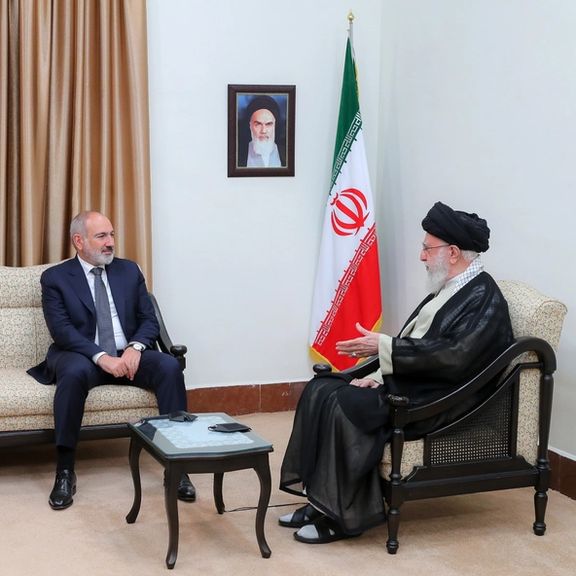Iran’s Leader vows stronger ties with Armenia

Iran's Supreme Leader reaffirmed a steadfast commitment to strengthening ties with Yerevan during a meeting with Armenia's Prime Minister, emphasizing mutual benefits.

Iran's Supreme Leader reaffirmed a steadfast commitment to strengthening ties with Yerevan during a meeting with Armenia's Prime Minister, emphasizing mutual benefits.
“We are deeply committed to enhancing our relations with Armenia, and the collaboration between our two nations, founded on mutual interests and independent of policies of others, will continue with unwavering strength,” Khamenei told Nikol Pashinyan on Tuesday.
Last week, Iran International reported that Tehran and Yerevan have signed an arms deal to supply Yerevan with military equipment and training valued at $500 million.
In a meeting preceding Iran's president-elect's swearing-in ceremony in parliament, Khamenei emphasized that the "security and prosperity of nations" are best ensured through self-reliance and fostering close cooperation with neighboring countries.
He stated that the "interference of distant powers" in the internal affairs of other nations "inevitably results in detrimental consequences for the interveners themselves."
After an apparent disappointment with its long-time ally, Russia, Armenia has been forging closer ties with the United States and France in recent months, including joint military drills with US forces in July.
According to a senior Middle Eastern military official, the reported Tehran-Yerevan agreement has been divided into several contracts and signed over the past few months. For security reasons, Iran International has withheld the official's identity.
Iran International has seen a list of military items Iran is purportedly set to supply Armenia, including drones such as the Shahed 136, Shahed 129, Shahed 197, and Mohajer, as well as air defense missile systems like the 3rd Khordad, Majid, 15th Khordad, and Arman.
The Iran-Armenia arms deal reportedly extends beyond providing suicide drones and air defense missiles. It encompasses intelligence cooperation, close military relations, training, and the establishment of bases on Armenian soil, the source disclosed to Iran International.
Following the report's publication, Armenia's Ministry of Foreign Affairs did not deny the deal in its official email response to Iran International. "Armenia is currently diversifying its security relations within the framework of international law. We don't have any further comment on this," stated a spokesperson for the Ministry of Foreign Affairs of the Republic of Armenia. Meanwhile, Iran's ambassador to Armenia, Mehdi Sobhani, denied the report.
Azerbaijan Republic is seeking a land corridor through Armenia to connect with the Azerbaijani enclave of Nakhichevan.
Khamenei says that Iran considers the Zangezur corridor “detrimental” to Armenia and “maintains a firm stance” on this issue.
"We are strongly committed to developing relations with Armenia, and cooperation between the two countries will continue robustly based on defined interests, without regard for the policies of others," Khamenei added during the meeting with Pashinyan.